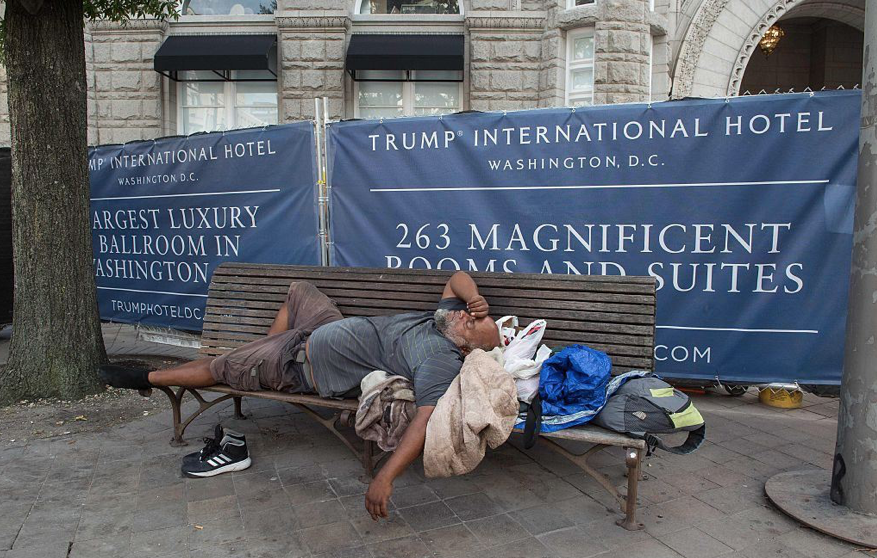CommentsGELFAND’S WORLD--Back in 1964, Roger Miller wrote King of the Road.Maybe it wasn't quite at the level of perfection of Dang Me,but it does speak to our current homeless question.
Trailers for sale or rent, rooms to let, fifty cents.
No phone, no pool, no pets, I ain't got no cigarettes
Ah, but, two hours of pushin' broom
Buys an eight by twelve four-bit room
I'm a man of means by no means, king of the road.
In the song, the narrator is something of a tramp, which in those days was defined (my thanks to Wikipedia) as someone who works only when forced to. (In the slang of the time, this was differentiated from a hobo, who is simply a migrant worker, and further differentiated from a bum, who does not work at all.)
What's interesting about this song is the cost of housing, quoted by the singer as "rooms to let, fifty cents." You can even get a room for the night by doing a little impromptu labor: "Two hours of pushin' broom buys an eight by twelve four-bit room."
Even taking into account inflation, that four-bit room is still only $4 in 2018 currency. If that Roger Miller tramp were to try and settle in for a whole month, that would add up to around $120.
This calculation raises an interesting point. In this modern urban world of ours, there doesn't seem to be any sort of gradual, sliding scale for the cost of available housing. Either the price is next to nothing (being homeless) or it's half a thousand and up. A quick check of online apartment ads and craigslist shows that the majority of rental quotes begin around $1200 (typically for studio apartments), show a plateau in the $2000-$2500 range, and then go on up to $5000 and more for luxury high rises and houses.
We might compare this situation to the price of food. You can get enough calories for a few days by purchasing a loaf of bread. You can get water for free, and you can get the amount of protein you need for a few dollars more. Of course, if you want to spend a lot of money, you can pay hundreds of dollars at a pricey restaurant, or you can pay less at a mid-level restaurant. There is a gradual sliding scale from fifty cents a day up to hundreds of dollars, with set-points at every level in between.
The same principle holds for transportation, ranging from expensive cars to busses to bicycles to walking. If you only need to travel a mile or two, you can figure out how to do it without coming up with a down payment of a thousand dollars. If you need to travel half way across the city, you can do so using what the MTA provides.
As stories of the newly homeless show, we don't have that kind of flexibility in the housing market. It's having enough money to pay the rent, quite a lot in this coastal market, or being in your car or out on the street.
I would suspect that many of the newly homeless could scrape up $30 a week for the advantage of having a roof and a lockable door. That's approximately the number that Miller quoted implicitly in King of the Road. Others could cover maybe $200 a month, and so on.
At a slightly richer level, you would expect that people with jobs could cover $400 a month. Interestingly, that is the predicted price for a newly announced selection of single room occupancy rentals. This is still a long way from Roger Miller's fanciful 4-bit room, but it might be affordable to a lot of people who would otherwise be living in a tent.
This is the part where the conservative side gets to score some points. We have regulations that define a minimum wage. Roger Miller's fanciful character probably wouldn't be allowed to work at two dollars an hour for that four-dollar room. Property owners would have a near-impossible time providing housing at $75 a month, what with requirements for habitability, seismic safety, and working plumbing.
This is the quandary of living in this modern urban society. There are sound social and economic reasons for having and enforcing a minimum wage. There are good and sound reasons for requiring that buildings be constructed so as not to collapse on their inhabitants during an earthquake. But one result is the scarp between the price of a rental and the amount of money that the suddenly unemployed person can raise.
I do not raise these points to suggest any simple solution to the homelessness problem in Los Angeles. We've come too far from the days of the frontier or even from the days when a quarter of the population could find a place to sleep on the farm. I raise this issue to point out that the newly homeless face "barriers to entry" when it comes to gaining the normal scale of housing. How different would things be if the currently homeless could find safe and comfortable shelter for that price of four dollars a night? They might gradually work their way up the ladder, eventually to achieve normal housing stability. And of equal interest, how many of the current tent dwellers would take advantage of the offer?
There are lots of other issues that merit more detailed discussion. But for the chronically homeless, there doesn't seem to be much in the way of gradualism when it comes to housing. I've purposely left out any discussion of subsidized housing and charitable activities on the part of benefactors, because I'm trying to consider an approach that would be stable within the capitalist economy.
(Bob Gelfand writes on science, culture, and politics for CityWatch. He can be reached at [email protected])
-cw
















